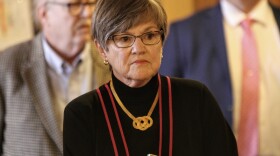The University of Kansas has reversed course and decided to leave it up to department chairs and directors whether to hold in-person classes this fall.
Faculty members had revolted last week after they were told to return to campus beginning Aug. 24, unless they could invoke an exemption under the Americans with Disabilities Act.
More than 50 department leaders signed a letter to Provost and Executive Vice Chancellor Barbara Bichelmeyer stating they believed that using the ADA process raised confidentiality concerns and was “impossibly unwieldy, discriminatory and perhaps illegal.”
On Monday, Bichelmeyer told the university’s department chairs and directors that decisions on courses, how they would be taught and teaching assignments “should be the purview of the department or program.”
“I’ve heard and understand that many are uncomfortable with using the ADA process for a variety of reasons,” Bichelmeyer said in a letter.
“So, I’m writing to propose an idea for a process that would negate the need for instructional personnel to use the ADA process and will allow them to make a much more informed decision, now that information regarding how we will go about protecting KU community members has been shared.”
Instead of filing for an accommodation under the ADA, instructors will simply be asked to indicate their teaching preferences and to note the safety level they require in order to teach in person.
Bichelmeyer said that while on-campus and in-person experiences represented the optimum campus experience, “hyflex” courses — giving students the option of attending classrooms, learning online or both — were also an option.
"We're continuing to do the work of reconciling," Bichelmeyer told KCUR.
Bichelmeyer said that the teachers' concerns were legitimate and understandable, "and this was just a case where trying to solve a problem with a precedent using the ADA doesn't work in an unprecedented situation."
"So we want faculty to tell us where they're going to be and weigh in on that," she said. "However, we'll continue to work to reconcile that in those cases where it's really important for the students to have an on campus experience. We can try to get that course delivered on campus. But we can't know what to do until we know what faculty's plans are."
Nicholas Syrett, chair of the Department of Women, Gender, and Sexuality Studies, told KCUR he and his colleagues were pleased with the outcome.
“Each instructor is now going to get a sort of mini-survey in which they’re given the options of what degree of comfort they have going back into the classroom and what various options would suit them,” he said.
Under the so-called Protect KU plan — described by KU Chancellor Douglas Girod as a “roadmap for a thoughtful, science-based return to campus” — every person on campus will be required to complete a daily health self-assessment using an app on their phone.
If they “pass,” the app will produce a QR code, which users will need to enter buildings on campus, according to the plan.
Other measures KU is adopting include configuring auditoriums, lecture halls and classrooms to allow for social distancing; requiring all faculty, staff, students and vendors to wear face coverings when they’re in common areas or within six feet of one another; and providing other options for protection like plexiglass barriers.
KU said it had purchased large quantities of personal protective equipment, including cloth faces masks, N95 respirators, hand sanitizer, sanitizing wipes, plexiglass sneeze guards and rubber gloves, that it would make available to teachers.
“We are constantly monitoring recent COVID-19 trends locally and nationally, and we will continue to adapt accordingly,” Girod wrote. “Our goal is to prioritize the health of our community members above all else while carrying out our mission of research and discovery, teaching and learning, service to our students, to the State of Kansas, and beyond.”
In a letter to faculty and staff Tuesday, Bichelmeyer said that it remained KU’s goal to have as many in-person, hybrid and hyflex classes as possible in the fall.
She noted that a recent survey by the Association of American Universities found that 51% of college-bound high school seniors said there “does not seem to be much point in enrolling” if instruction is only virtual.
“The best opportunity for KU to emerge from the financial challenges we face as a result of COVID-19 with the least long-term damage is to educate more students, and subsequently to gain the tuition revenue they provide,” Bichelmeyer wrote.
Copyright 2020 KCUR 89.3








